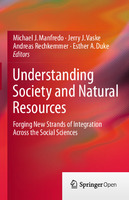Understanding Society and Natural Resources: Forging New Strands of Integration Across the Social Sciences
Contributor(s)
Manfredo, Michael J. (editor)
Vaske, Jerry J. (editor)
Rechkemmer, Andreas (editor)
Duke, Esther A. (editor)
Collection
European Research Council (ERC); EU collectionLanguage
EnglishAbstract
In this edited volume leading scholars from different disciplinary backgrounds wrestle with social science integration opportunities and challenges. This book explores the growing concern of how best to achieve effective integration of the social science disciplines as a means for furthering natural resource social science and environmental problem solving. The chapters provide an overview of the history, vision, advances, examples and methods that could lead to integration. The quest for integration among the social sciences is not new. Some argue that the social sciences have lagged in their advancements and contributions to society due to their inability to address integration related issues. Integration merits debate for a number of reasons. First, natural resource issues are complex and are affected by multiple proximate driving social factors. Single disciplinary studies focused at one level are unlikely to provide explanations that represent this complexity and are limited in their ability to inform policy recommendations. Complex problems are best explored across disciplines that examine social-ecological phenomenon from different scales. Second, multi-disciplinary initiatives such as those with physical and biological scientists are necessary to understand the scope of the social sciences. Too frequently there is a belief that one social scientist on a multi-disciplinary team provides adequate social science representation. Third, more complete models of human behavior will be achieved through a synthesis of diverse social science perspectives.
Keywords
social science integration opportunities and challenges; water managing; social ecological systems; status of integration; humanity and the biosphere (mahb); representing human individuals; environmental problem solving; human sustainability; livelihoods; poverty and conservation; resouce challenges and conflicts; emerging infectious diseases; land degradation and desertification; risk governance research; science during crisis; facilitating social science integration; land change research and modeling; solving sustainability challenges; natural resource social science integration; the social-ecological system framework; climate change and society; Decision-making; Socio-ecological systemDOI
10.1007/978-94-017-8959-2ISBN
9789401789592Publisher
Springer NaturePublisher website
https://www.springernature.com/gp/products/booksPublication date and place
2014Grantor
Classification
Sociology


 Download
Download Web Shop
Web Shop